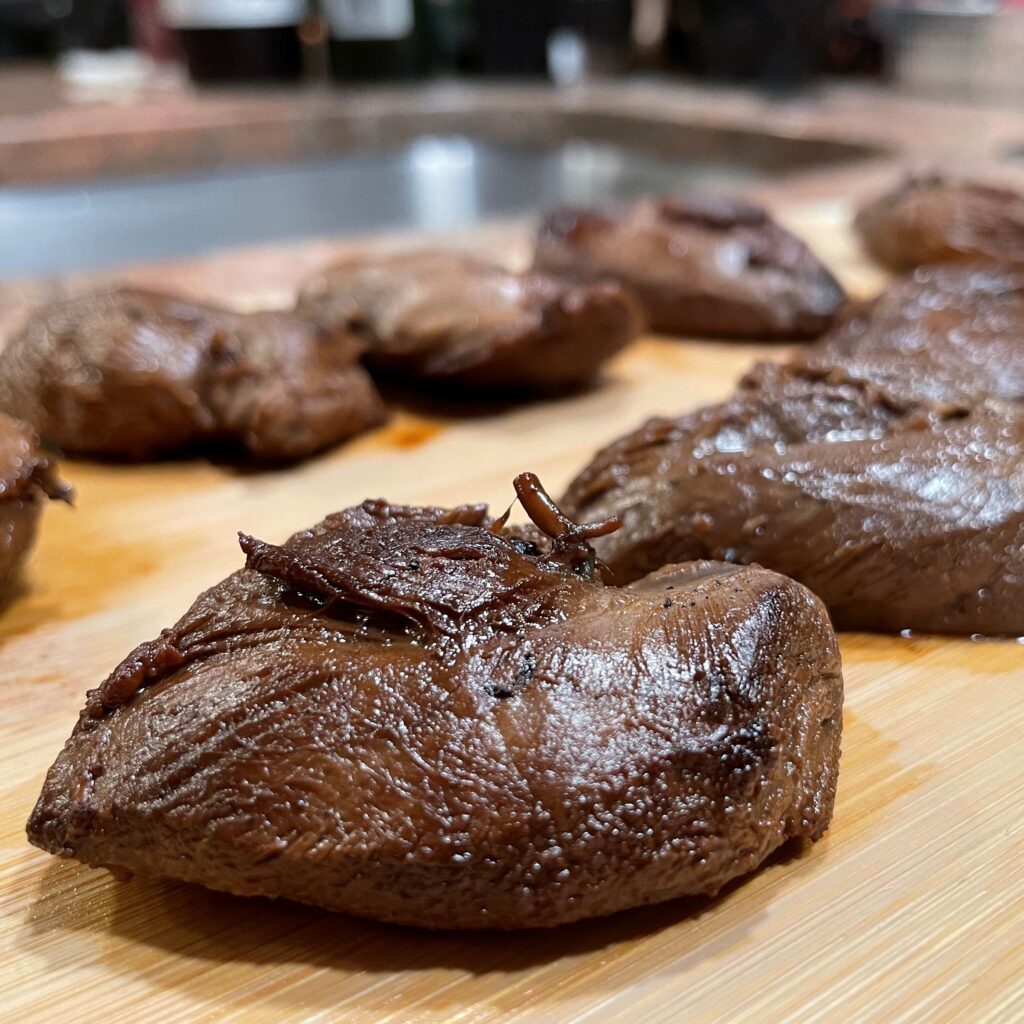
It’s Sunday afternoon, and I just filleted off several pairs of duck breasts to marinate before I sear them off for dinner. Not wanting to let the bones go to waste, I tossed them into a pot and turned the burner up on high to let them take on a little bit of color. As they browned, I finished a simple marinade, substituting what I had in the fridge for what Chef Tori’s recipe from last week called for, then dug deep into the freezer for some chopped onion and carrot I’d stashed who knows how long ago because I don’t have any fresh here. The bones became fragrant, so I covered them with water and lowered the flame. Scum began rising, and I skimmed it off over and over again until my nascent stock cleared and I dumped in those slightly less frozen vegetables. Now I’m waiting, and thinking about some of the stories we tell ourselves about who we are, and how it turns out so many of them aren’t or don’t have to be true after all.
See, I can’t cook. I’m very certain I cannot. I’m a recipe-follower, which means I’m a baker. A chemist in the kitchen, with no knife skills and little creativity. I can’t even decorate a cake. I make a mean cookie, but dinner is definitely not my domain. These are dicta of my existence.
And yet, however true that might have been once, it clearly no longer is. Were it so, I’d not have the confidence to try to turn bird parts with a feathered wing still attached (for identification) into a meal, or to improvise even the simplest broth. It’s true that I’m not quite coordinated enough to make complete dinners with sides and all ready at the same time, let alone creating enormous and fancy spreads. Still, somewhere along the struggles of wanting or having to put something on the table when I lived on my own, of pestering for explanations and demonstrations, and yes, following recipes, it turns out that I learned enough to figure out new things all on my own. It’s true that my duck breasts were a little too lemony and that my broth turned out slightly cloudy, but they still turned out beyond edible and into tasty. The non-cooking character of me in my head is no longer a facet of my current story because, as a friend reminded me, “can’t” is followed by “yet.” Sometimes it requires working towards a specific goal of making can’t into can, but sometimes it happens on its own as we learn and evolve into new selves, or as we grow into the selves we’ve always been. The only way we can know if that story we are so certain of is still the case is to stop and examine, objectively, who we really are.
The lessons from our guides and chef were part of the transformation in my head from kitchen disaster to kitchen …amateur. It wasn’t just that, though. It was also the confidence in me and support I had from my new hunting buddies, bolstering that from the other people in my life with that same faith. Even more, it was the moments of peace and contemplation in the duck blind, where the distractions are few and I could – was nearly forced to – pause and think. It’s not so much that I explicitly decided in the pre-dawn hours that I was going to be someone who could cook if I wasn’t already, but that as I mused about the birds soon to fly overhead and my hope to harvest some and then to ask to watch and attempt to process the meat, that some part of me decided that I would and could take the experience to its conclusion and actually prepare and eat them too.
The story of myself that I shifted last week was that I couldn’t cook. Other stories we might tell ourselves about us might be that we can’t do a push-up, or that we can’t play a musical instrument, or that we can’t paint a portrait. We believe we are, will always be, the quiet girl or the wild one, the mother or the wife, the sports star or the STEM nerd. We are convinced we cannot leave the rut of the life we’ve always known, that we cannot live by ourselves, that we cannot launch new careers, that we cannot win a physical fight for our lives. And maybe that’s true right now. But we aren’t stuck there, nor are we destined to return there even if we waver between identities, knowing who we are one day and not the next. It could be slow, incremental development, some or none of which is aimed at shifting the main character of your story into someone new. It could be a singular, life-changing experience from which you emerge, knowing you are not who you were, that you need only set into motion the new direction your plot is taking. Or it could simply be a realization that you had a vision of yourself who was only ever a story and she never really existed.
So tell me, if you please, a story about who you think you are. Then tell me who you really are.




